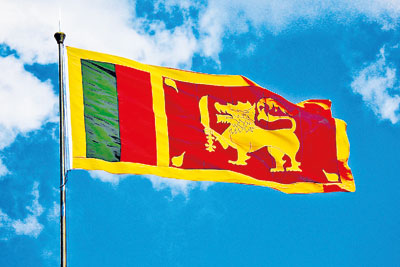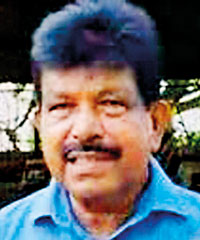Columns
Did the 76 year curse end this Independence Day?
View(s): 478
 The NPP government had come to power mainly on the slogan to finally end the 76-year curse that began, as they said, the day the Union Jack was unfurled and, in its stead, the Lion flag hoisted to freely flutter over the independent isle of Ceylon.
The NPP government had come to power mainly on the slogan to finally end the 76-year curse that began, as they said, the day the Union Jack was unfurled and, in its stead, the Lion flag hoisted to freely flutter over the independent isle of Ceylon.
It marked the end of an insufferable 133-year era when the island people were harnessed to the British yoke and the land lay completely under the sword of a foreign conqueror. Never in the field of Lankan history had any invader succeeded in his attempts to claim total conquest of the island. Only with the fall of Senkadagala, the last stronghold of the Sinhalayas, did Kanda Uda Pas Rata yield its kingdom. Not by a grovelling surrender but through a dignified treaty, the Kandyan Convention.
It was signed on March 15, 1815. It was an agreement to vest dominion of the Kandyan provinces in the sovereign of the British Empire. In return, Buddhism was declared inviolable, ‘and its rites, ministers, and places of worship were to be maintained and protected.’
Another clause was: ‘All civil and criminal justice over Kandy to be administered according to the established norms and customs of the country, the government reserving to itself the rights of interposition when and where necessary.’

THE LION FLAG: Braving ill winds for 77 years
The final curtain fell on the Lankan Kingdom, which had continued unbroken for more than 2300 years, mainly due to internecine court warfare in the Kandyan Kingdom. The treachery of Kandyan chieftains and the sadistic cruelty of its outsourced king gradually turned the people away from king and court. The final straw was when the king ordered the beheading of the two small sons of traitor Ehelepola Adigar in the presence of their mother, who was subsequently drowned in the Kandy Lake built by the king himself.
The outraged spelt doom on the kingdom, and the people began their search for a deliverer to replace the king—anyone but the king. The writing was writ large on every mountain wall. Thus began the 133-year colonial curse that ended only when the British left these shores.
But the passing of the sceptre to native hands, cried the JVP on pre-election stages, marked the affliction on the land of a new 76-year curse.
What exactly is this seventy-six-year curse six million voters forgot to ask that began shortly after the day the British quit India and set sail home to Old Blighty, bestowing, on the way out, the reins of government as a parting gift when they departed from the entire region?
Having lost the Kohinoor diamond of their empire, it did not make any economic sense to maintain a far-flung tiny ruby-shaped island, especially when the Second World War had left their treasury coffers depleted and their ambitious spirits drained. The sun had set on the age of empire building and empire defending, and the colonial spectre had fled their sceptred isle’s shores.
They have painted the founding politicians who had presided over the birth of an independent nation and painted every politician thereafter with the same tar and blackened their names and characters in the hall of infamy. Except for that, what else?
Nearly five months have flown since they came to power, riding on a popular wave of promises which they say they intend to keep once the plans are ready to be implemented. Remember, though an indulgent nation may grant all the time in the world, time waits for no man, and the people are in an awful hurry.
Especially when the rice they daily eat—and some eat it three times a day—is in short supply and hard to find even at a high price in a land once known as the granary of the East. And the coconut, which is used in the sambal we eat, has suddenly become expensive when it was nothing more than the humblest side dish before the elections? Perhaps it’s the coconut-plundering rilaw brigade that robs us of our daily nut? Mystified, too, to find, in a land surrounded by an Indian sea, no salt?
Eager to know whether the 76-year curse has ended? Or has it just begun to take effect?
Perhaps a new independent group should retreat further back in history and refer to the deceived Kuvenie’s curse that makes the people end up deceived at every successive elections.
|
NPP MPs’ dream car bubble bursts Even before the elections, the JVP’s pet hate had been the ‘duty-free permit’ privilege accorded to all MPs. The political rhetoric of envious hatred, lambasted from every political stage, had aroused the fury of the masses to further condemn MPs as a corrupt bunch of well-fed pussycats living luxurious lives in government houses and eating fancy five-star meals at the parliamentary cafeteria on public funds. “When we come to power,” they blared from every stage and social media outlet, “we shall not give duty-free cars or live in government houses or eat free meals at Parliament’s canteen. We will travel as the masses do, live as the masses do, and eat as the masses do.” And all who heard them at that hour could scarce forbear to cheer. Even JVP parliamentary hopefuls, to whom the Diyawanna oasis was still but an elusive dream, welcomed the spartan existence for all MPs and cheered louder than anyone else. 
HOPES DIE HARD: The wait in vain for Dharmapriya Dissanayake True to their word, once assuming the reins of power, the announcement came from the JVP leadership: A total ban on duty-free permits to import vehicles was placed. It was also partly due to IMF restrictions. But soon, with the new government faithfully and meticulously bearing Ranil’s IMF programme above its head like a religious offering to temple gods, and extremely cautious not to dislodge the arrangement of fruits on the platter, foreign exchange became available to import a limited stock of vehicles. As the news was greeted heartily by a vehicle-starved market, questions arose in the hearts of all MPs: What about us? Are we denied the plums of the national cake? The seed of desire was planted. And quickly taking root. On January 19, the NPP’s Kurunegala District MP, Dharmapriya Dissanayake, was over the moon at the giddy prospect of getting a new vehicle for his own use. He told the media: “We expect all MPs to receive new vehicles. To date, MPs have not been allocated any official vehicles. An agreement has been reached to provide vehicles to MPs. While the specific model has not been decided yet, the vehicles will certainly be new and are expected to arrive within the next couple of months.” His ship of hope had sailed into harbour even before the container vessel carrying new vehicles could make Lankan waters. With plans laid, with the agreement reached, with invoices opened, with the new vehicles safely at sea, and with his government fulfilling its promises as usual, especially to its members, he could hardly contain his glee. The seed of desire was poised to break out in bloom. Then came the welcome announcement. Instead of duty-free vehicles, the government will provide vehicles to all MPs to attend to their official duties and development work in their electorates. After five years, they can even take it home with them after paying the net value to the government less the depreciation rate, said Minister Vijitha Herath on Ada Derana’s 360-degree programme. The government hailed its own decision, extolling the virtuous savings it would bring. The people, it seemed, had bought the story that the despised, grotesque privilege granted to pampered fat cats in Parliament to import any fancy vehicle duty-free and ride hotshot to their electorates to impress the peasantry in V8s or Range Rovers would be at an end. For over three decades or more, ever since former President J.R. Jayewardene granted special duty-free permits to MPs, billions had been lost to Treasury coffers in lost duty in terms of duty revenues. But the euphoric mood instantly changed when some bright spark pointed out—like the child pointing at the emperor’s new designer clothes—that the government, wallowing in self-praise, had been blind to the flip side of the coin. The much-decried duty-free scheme had its benefits too. Though exempted from duty, the MP still had to pay the balance sum on the nail. He will thenceforth have to maintain the vehicle out of his own pocket like another private buyer. He will have to pay the insurance premiums, the annual revenue tax, pay for regular services, for its tyres, for its repairs, replace stolen side mirrors and lights, wipers, hubcaps, and bear all expenses to keep the vehicle shipshape and roadworthy. Consider, for instance, the enormous cost to the Treasury if 225 vehicles of MPs had to be maintained at government expense. For a period of five years? Rather than bear the burden of ensconcing all MPs in government-owned vehicles and maintaining the same in mint condition for five years, it’s far better for the government to forego duty levies and wash its hands of the whole cumbersome and expensive responsibility of playing valet to MPs, as successive governments have done in the past. Then came the killer blow. Instead of providing vehicles to MPs as the government had announced last month, they will give none at all. If government MPs wished to inspect development projects in their electorates, they could borrow one, if necessary, from the common vehicle pool. JVP MPs’ bud of hope nipped in its bloom. But the seed had taken deep root.
|
|
| Don’t cry Mrs. World Runner-Up, you’ll still be first in Lankan eyesTake a bow, Mrs. World Runner Up, and wipe that tear from your sweet eye. Now give us a flash of your dazzling smile that won the hearts of Mrs. World judges to choose you second best and moved us no end to behold your beauty with supreme delight.
Returning from the Mrs. World pageant held in swinging Las Vegas, the gambler’s town where the wheel never stops, Paris raised Mrs. World Runner-Up, Ishadi Amanda spoke of her heartbreak night and cried buckets of tears after losing the crown to her South African roommate Viktoria Horshkova.
“As they say in this catwalk business,” Ishadi declared, “you become a real queen when you fix each other’s crowns.” Reciprocal altruism, or you scratch my back and I’ll scrub yours, seems to be the maxim in this fashion game. Probably the bets were on Ishadi to win that night, but, in this gambler’s paradise, fickle Lady Luck had fled to rest on Viktoria’s head instead. Though judged second best in the beauty stakes, Ishadi made the news when a video of hers went viral in the US of A. It showed her worshipping her living God on earth, her fashion guru, Chandimal Jayasinghe, who had guided her every catwalk step and taken the Lankan French expat, oozing wig Paros chic, to world acclaim. “If not for Chandimal and his brand,” she says, “I would be just another woman doing a daily job in France. I do not worship every Tom, Dick or Harry but I worship Chandimal because it was his brand that paved the way to my triumph. He is the one who brought out the beauty in me. And I respect and worship him in gratitude.” She is also grateful to her parents. “Even though I was born in Sri Lanka, I was raised in France. But I haven’t forgotten the Sri Lankan culture, thanks to my parents. I have a very supportive family, and if not for them, I wouldn’t have come this far. They encouraged me to participate in beauty pageants since I was very young.” Don’t fret and weep idle tears of disappointment or rue the night you lost the crown. Worthy qualities of the spiritual East are not gone astray on the High Street of Fashion’s Boulevard but long ingrained in you, made you more humble the higher you rise, and bring out not only thy beauty but also the woman in you. Take a bow, Ishadi Amanda. You have done Lanka proud. Though you have lost the crown, you are, in Lanka’s eyes, the most beautiful Mrs. World. |

 “I cried since I had pinned my hopes on winning, but after the initial burst of disappointment, I felt glad that, at least, my roommate and friend Viktoria had bagged the Mrs. World crown. Perhaps the judges chose her for the crown depending on her beauty and overall performance.”
“I cried since I had pinned my hopes on winning, but after the initial burst of disappointment, I felt glad that, at least, my roommate and friend Viktoria had bagged the Mrs. World crown. Perhaps the judges chose her for the crown depending on her beauty and overall performance.”